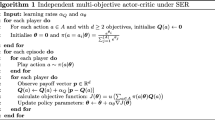Abstract
In many two-sided search applications, autonomous agents can enjoy the advantage of parallel search, powered by their ability to handle an enormous amount of information, in a short time, and the capability to maintain interaction with several other agents in parallel. The adoption of the new technique by an agent suggests a reduction in the average cost per interaction with other agents, resulting in an improved overall utility. Nevertheless, when all agents use parallel search in Multi-Agent Systems (MAS) applications, the analysis must take into consideration mainly equilibrium dynamics which shape their strategies. In this paper we introduce a dual parallel two-sided search model and supply the appropriate analysis for finding the agents’ equilibrium strategies. As a framework application for our analysis we suggest and utilize the classic voice communication partnerships application in an electronic marketplace. By identifying the specific characteristics of the equilibria, we manage to supply efficient means for the agents to calculate their distributed equilibrium strategies. We show that in some cases equilibrium dynamics might eventually drive the agents into strategies by which all of them end up with a smaller expected utility. Nonetheless, in most environments the technique has many advantages in improving the agents expected utility.
This research was supported in part by NSF under grant #IIS-0208608.
Preview
Unable to display preview. Download preview PDF.
Similar content being viewed by others
References
Azoulay-Schwartz, R., Kraus, S.: Stable strategies for collaborative behavior of agents in answering queries. Artificial Intelligence journal 154(1-2), 43–93 (2004)
Breban, S., Vassileva, J.: Long-term coalitions for the electronic marketplace. In: Spencer, B. (ed.) Proc. of E-Commerce Applications Workshop (2001)
Burdett, K., Wright, R.: Two-sided search with nontransferable utility. Review of Economic Dynamics 1, 220–245 (1998)
Decker, K., Sycara, K., Williamson, M.: Middle-agents for the internet. In: Proc. of IJCAI, pp. 578–583 (1997)
Ito, T., Ochi, H., Shintani, T.: A group-buy protocol based on coalition formation for agent-mediated e-commerce. IJCIS 3(1), 11–20 (2002)
Lermann, K., Shehory, O.: Coalition formation for large scale electronic markets. In: Proc. of ICMAS 2000, Boston, pp. 216–222 (2000)
McMillan, J., Rothschild, M.: Search. In: Aumann, R.J., Hart, A.S. (eds.) Handbook of Game Theory with Economic Applications, pp. 905–927 (1994)
Morgan, P.: Search and optimal sample size. Review of Economic Studies 50(4), 659–675 (1983)
ITU-T Recommendation P.800. Methods for subjective determination of transmission quality (August 1996)
ITU-T Recommendation P.862. Perceptual evaluation of speech quality (pesq), an objective method for end-to-end speech quality assessment (February 2001)
Sarne, D., Kraus, S.: The search for coalition formation in costly environments. In: Klusch, M., Omicini, A., Ossowski, S., Laamanen, H. (eds.) CIA 2003. LNCS (LNAI), vol. 2782, pp. 117–136. Springer, Heidelberg (2003)
Sarne, D., Kraus, S.: Agent’s Multiple Inquiries for Enhancing the Partnership Formation Process. In: Klusch, M., Ossowski, S., Kashyap, V., Unland, R. (eds.) CIA 2004. LNCS (LNAI), vol. 3191, pp. 286–302. Springer, Heidelberg (2004)
Sarne, D., Kraus, S.: Time-variant distributed agent matching applications. In: Proc. of AAMAS 2004, pp. 168–175 (2004)
Shimer, R., Smith, L.: Assortative matching and search. Econometrica 68(2), 343–370 (2000)
Sycara, K., Widoff, S., Klusch, M., Lu, J.: Larks: Dynamic matchmaking among heterogeneous software agents in cyberspace. Autonomous Agents and Multi-Agent Systems 5, 173–203 (2002)
Author information
Authors and Affiliations
Editor information
Editors and Affiliations
Rights and permissions
Copyright information
© 2006 Springer-Verlag Berlin Heidelberg
About this paper
Cite this paper
Sarne, D., Kraus, S. (2006). Agents’ Strategies for the Dual Parallel Search in Partnership Formation Applications. In: Faratin, P., Rodríguez-Aguilar, J.A. (eds) Agent-Mediated Electronic Commerce VI. Theories for and Engineering of Distributed Mechanisms and Systems. AMEC 2004. Lecture Notes in Computer Science(), vol 3435. Springer, Berlin, Heidelberg. https://doi.org/10.1007/11575726_12
Download citation
DOI: https://doi.org/10.1007/11575726_12
Publisher Name: Springer, Berlin, Heidelberg
Print ISBN: 978-3-540-29737-6
Online ISBN: 978-3-540-33166-7
eBook Packages: Computer ScienceComputer Science (R0)




